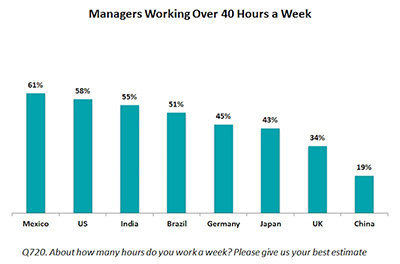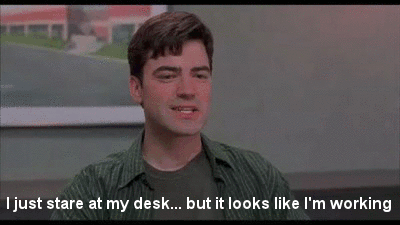The 40-hour work week. The 8-hour work day. Ah yes…
These two measurements are staples of the American workforce, entrenched memes in most industries and positions. One size fits like a first world glove.
But do these schedules really make sense? Is that the best way to work to remain competitive before the arriving robots take our jobs? Is there a better way to work?
The answers aren’t blowing in the wind, even if Bob Dylan disagrees, but the data could lead to liberating answers in your professional and even personal life.
How did the 40-hour work week begin, though?
In his popular article for Buffer, The Origins of the 8-House Workday and Why Should We Rethink It, Leo Widrich offers the history of the modern workweek. He explains that today’s work hours are certainly better than the 19th century’s six days of 10-16 workday hours—all to leverage the busy Industrial Revolution.
These incredibly long work days weren’t sustainable, at least for some. A brave (or maybe lazy) man named Robert Owen started a campaign to have people work no more than 8 hours per day. His slogan was “Eight hours labour, eight hours recreation, eight hours rest.”

Owen’s calls took a while to find ears, but in 1914 Ford Motor Company not only adopted the 8-hour workday it doubled the pay of its workers. The result was an increase in employee productivity and double profits within two years.
The business world figured out then that treating workers better actually benefited a company, and this 8-hour day became a standard across western society.
But are 8-hour work days necessary?
Obviously, we live in a different times, a world of technology, automation and shared economies. Does the 8-hour workday/40-hour work week really “work” in the Information Age?
Needless to say, many proponents exist for fewer work hours, contending they result in more productivity (just as Owen did). One could spend 40 hours on Google surfing for the arguments for shorter work schedules.
One of the leading proponents would be Tim Ferriss, who makes the case in his bestseller, The 4-Hour Workweek. The book mostly focuses on being a nimble entrepreneur, but it does contain insights on the bulkiness of working an 8-hour day.
Another example would be Ryan Sanders, cofounder of the HR software maker BambooHR, who instituted an “anti-workaholic policy” in his company. None of his 130+ employees is allowed to work more than 40 hours. Sanders believes that “Burning out is bad for the employees, bad for their families and bad for business.”
On the other hand, many worry that we’re actually regressing to Industrial Revolution levels of work. As Business Insider reports, Americans are staying longer on the job, where “58% of managers in the US reported working over 40 hours a week.” (We work harder than the Chinese yet less than Mexicans.)
Research says longer work hours are hurting productivity across the board, and the Business Insider piece agrees. As a matter of fact, the standard workday is not even that productive. Research from American Online and Salary.com found that “the average worker wastes about two hours every eight-hour workday, doing stuff like making personal calls or surfing the web.”
More time is not the solution, but better time.
Working 40 or more hours is also creating a culture of dishonesty. As Quartz reports on a study from Market Probe, Americans pretend to be busy, even when there is no reason for it except for being at work, because the feel busy equates with success. The article states:
The report’s authors suggested that our tendency to lie about how busy we are comes from our belief that being busy is equivalent to “leading a life of significance” and not wanting to be “relegated to the sidelines.” This belief, they found, was paramount in countries that applaud hectic lifestyles, such as Germany and the US, whereas countries known to value leisure above work, like Italy and Belgium, are less convinced that keeping busy is a good thing.
Emotional intelligence expert, Dr. Travis Bradberry, writes that this obsession with being busy is detrimental to our jobs, quoting several studies:
They found that the belief that busyness is a sign of success and hard work is so prevalent that we actually fear inactivity. A recent study coined the term idleness aversion to describe how people are drawn to being busy regardless of how busyness harms their productivity.
So what happens next?
Eliminating the 40-hour workweek will not be easy. After all, part of the reasoning behind standard work schedules is to be fair to all employees (although Henry Ford himself admitted that he lowered work hours not out of fairness or compassion, but so that his employees might have more time to buy products like his cars!).
As Forbes’ Jayson DeMers explains:
Giving all your employees exactly the same schedule and exactly the same number of hours may seem like a “fair” system, but it’s ultimately illogical. Real life doesn’t adhere to such fixed standards, and trying to compartmentalize the natural flow of work can lead to serious problems in individual and company-wide productivity.
Fairness may seem right but it’s ultimately not right for a productive company. Yet it’s hard to argue against fairness.
Blueprints to work less than 40-hours a week
For employers, as DeMers advices, the key is to create a more “project-based” office environment instead of an “hour-based” environment. Meeting deadlines should reign over counting the minutes.
Beyond this, many companies are already experimenting with these options to the 40-hour workweek:
– Four-Day and Three-Day Workweeks
– Flex-Time (or self-schedule)
– Working From Home
– Employee Votes (letting workers decide hours on a rotating basis)
Again, these schedules are based on a “project-based” system where results are more important than clock management. Of course, these options would not work in many industries such service or health.
In truth, other countries are now finding success with experimentation of shorter workweeks. Danish workers average 33 hours per week . Sweden is testing a 6-hour workday. One Swedish executive stated that the change “hasn’t really made a major difference in how people work.”
The key, according to the executive, is to ensure employees work efficiently and without distractions such as social media.
Until you find yourself in the right company or the right labor-shift paradigm, many experts (including Ferriss) contend you should just worry about your own time management. In other words, become a one-person “project-based” employee, if anything to maximize whatever hours lie ahead at work.
As Widrich explains in the Buffer article:
Human minds can focus on any given task for 90-120 minutes. (Then it’s time for a small break). Thus, the thinking should not be about what can be accomplished in eight hours, but what can I get done in a 90 min session.
This attitude makes the work hours less impactful and the day more manageable.
Just as important, champion the idea that the mind requires breaks and these breaks reward the mind with more productivity.
As Michael Cho writes in Entrepreneur:
Research discussed in the landmark book Creativity and the Mind showed that regular breaks significantly enhance problem-solving skills, partly by making it easier for you to go through your memories to find clues.
Focusing only on your work for four or five hours straight limits your chances to make new, insightful neural connections, which won’t help you when you need to be creative.”
To wit: tackle projects before you, take breaks, and recycle this schedule throughout the day.
Oh, and as most experts agree, including Widrich, Ferris, and Bradberrry, distractions and multitasking are destroyers of productivity and accumulators of needless work hours. Multitasking may make us feel good, but as we’ve researched, it’s damaging to the mind and results in the U.S. economy losing $ 650 billion a year.
I hope this humble and brief article sparks the beginning not so much as a movement but a movement to a better work life for you. I hope you haven’t been multitasking while reading it. I hope…
Oh, boss coming around…I better look busy…
Digital & Social Articles on Business 2 Community
(119)









